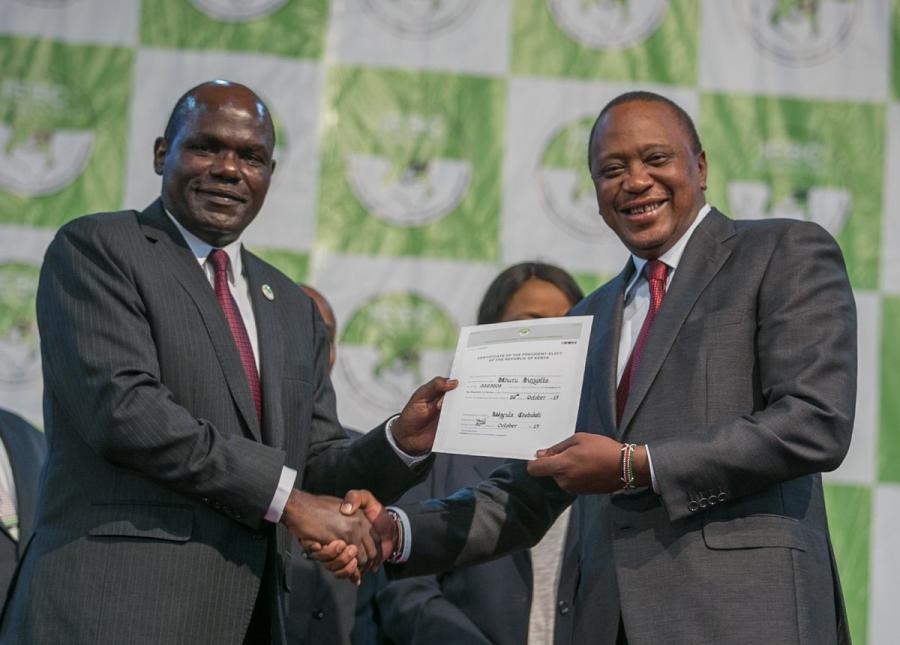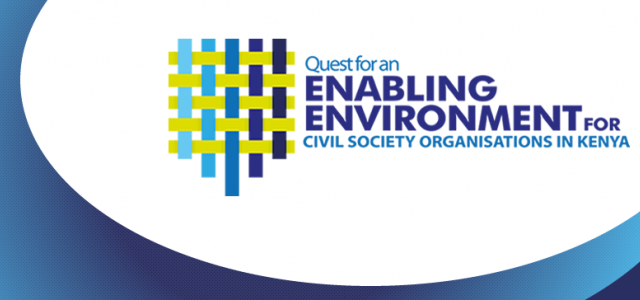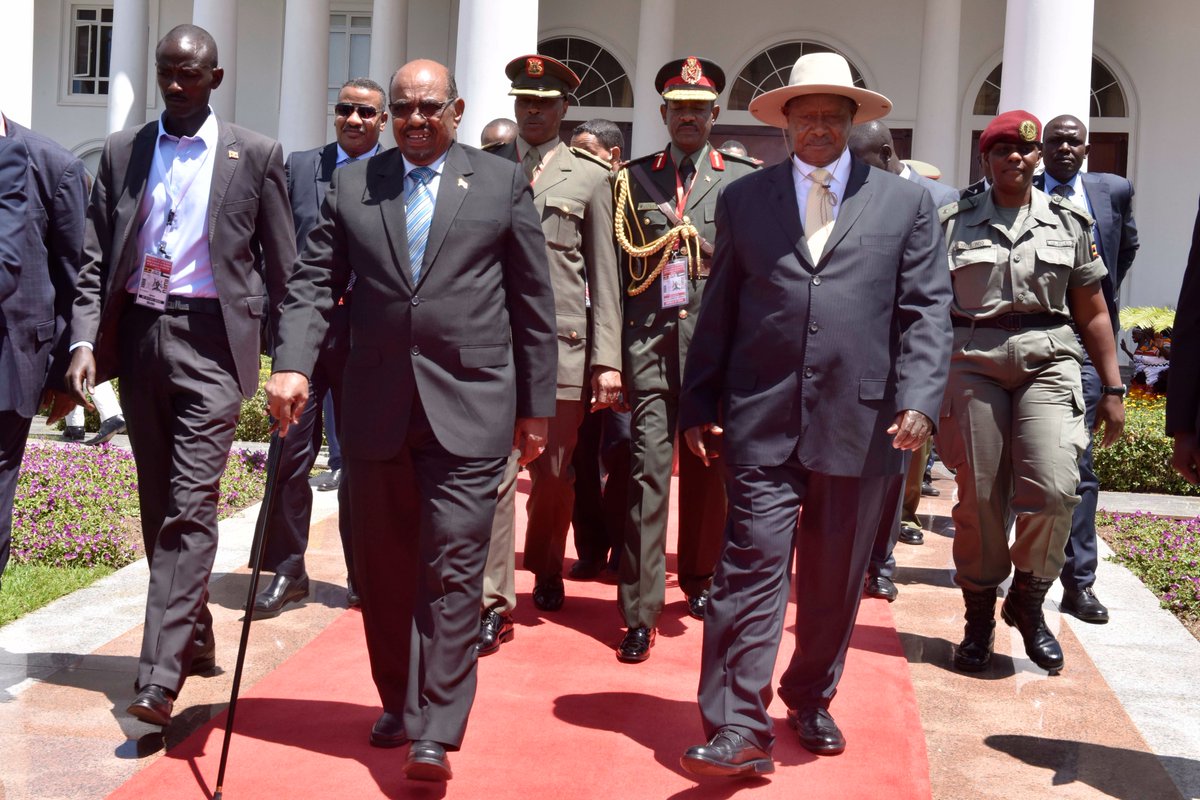Human rights activists Njonjo Mue and Khelef Khalifa have petitioned the Supreme Court to annul the declaration of Uhuru Kenyatta as president-elect after the October 26 fresh election. The petition alleges that no nominations were conducted for the presidential election; the principle of universal suffrage was violated; the electoral management body was not independent, impartial or neutral; and that the election was conducted in an environment rife with violence, intimidation and blatant breaches of the law.
Court papers filed on Monday argue that Mr Kenyatta did not receive a new nomination certificate to take part in the October 26 election, stating: “A nomination certificate issued to a candidate under Section 14 of the Elections Act is valid only for the election for which it is issued”. Although Mr Kenyatta had been nominated to contest the August 8, 2017 election in May this year, the law requires that a presidential election be initiated through a nomination.
A majority of four Supreme Court judges annulled the August 8, 2017 presidential election on September 1, 2017 citing illegalities and irregularities in its conduct as cited in the petition by National Super Alliance presidential candidate Raila Odinga. It also ordered a fresh presidential election in 60 days. Two judges wrote dissenting opinions.
The new petition claims that the Independent Electoral and Boundaries Commission failed to hold the fresh election in strict compliance with the Constitution and the law as ordered by the Supreme Court. By presiding over an election in which 27 constituencies did not vote, the petitioners argue, the IEBC violated the constitutional principle of universal suffrage. Voting was delayed for two days in Turkana and Fafi, and did not take off at all in 25 constituencies in Homa Bay, Migori, Siaya and Kisumu counties.
IEBC chairman Wafula Chebukati’s public admission that he had no control over the IEBC a few critical days to the election has been cited as giving the impression that the exercise conducted on October 26, 2017 was a waste of time, money and resources, evident in the low voter turnout on the one hand and the failure to even hold the election in other parts of the country.
Mr Mue, who is chairman of the Kenya Section of the International Commission of Jurists, argues in his supporting affidavit that the IEBC went ahead to hold the fresh election despite NASA candidate Raila Odinga’s withdrawal from the race. The withdrawal, he argues, automatically triggered a vacation of the scheduled election. Mr Mue’s co-petitioner, Mr Khalifa, is chairman of Muslims for Human Rights and is a former commissioner at the Kenya National Commissioner for Human Rights.
The IEBC initially set the fresh election for October 17, 2017 with Mr Kenyatta and Mr Odinga as the sole candidates before moving the date to October 26. The High Court subsequently ordered the IEBC to include Dr Ekuru Aukot on the ballot, but the commission did more by adding him and another four candidates.
The petitioners have taken issue with the IEBC’s decision to arbitrarily add candidates to the ballot, including Mr Shakhalaga khwa Jirongo, who had been excluded following a bankruptcy judgment at the High Court, which was later lifted by the Court of Appeal.The petitioners accuse the IEBC chairman of “making irrational, capricious, inconsistent and unpredictable decisions” especially in limiting the election to only two candidates and amending the ballot to include other names.
“The IEBC thinks the law is a nuisance and only follow it when they want to or when it suits a particular predetermined outcome,” the petitioners say.
The grounds for the petition further accuse the IEBC and its chairman of dishonesty, ignorance of the law and incompetence in “failing to acknowledge and realise that a dead election could not be revived” when they acknowledged Mr Odinga’s withdrawal from the election but failed to act on it.
“The election conducted on October 26, 2017 failed to meet the general principle stipulated under Article 81(d) of the Constitution of Kenya of universal suffrage based on the aspiration for fair representation and equality of vote,” the petition adds. The petitioners argue that Article 138(2) provides that at a presidential election “if two or more candidates for President are nominated, an election shall be held in each constituency”.
The petitioners add that it was clear that given the climate of violence and intimidation in the country, it was clear that some people would be denied the opportunity to participate in the election.
A supporting affidavit by John Paul Obonyo an observer in Bangladesh informal settlement in Mombasa says the poling station at St Mary’s Primary School was covered in human excrement, whose stench made it uninhabitable. The IEBC decision to hold the election in the face of the difficulties it faced sent the message that votes in some parts of the country do not count, the petitioners add.The petitioners argue that the election was not free and fair because it was characterised by violence, intimidation and improper influence of corruption. They have cited IEBC’s failure to update Kenyans on the voter turnout every three or so hours on the day of the election.
Mr Chebukati allegedly gave various inconsistent and contradictory statements on the percentage of the voter turnout and on that basis, the petitioners now want access to the Kenya Integrated Elections Management System kits and servers to ascertain and verify the total number of actual voters. The petition claims that the IEBC admitted that various results transmissions kits had failed and that various voters were subjected to the complementary identification system. They now want the court to order that IEBC produce documents for each voter identified outside the electronic register.
Now, the petitioners are asking the Supreme Court to order the IEBC to produce all the election materials including polling day diaries, electronic documents, devices and equipment for the October 26 poll, together with the Form 32As used in the complementary voter identification system within 48 hours.
Further, the petitioners argue that the divisions in the IEBC meant that it was not the independent body contemplated in the Constitution to conduct elections. IEBC, the petitioners argue, did not administer the election in an impartial, neutral, efficient, accurate and accountable manner.Mr Kenyatta’s running mate, Deputy President William Ruto, and his political party, Jubilee, are labelled as the fiercest defenders of the IEBC even when a court has found it guilty of wrongdoing.
Also cited for interfering in the election is Education Cabinet Secretary Fred Matiang’i for allegedly directing the IEBC to hold the fresh election on or before October 17, 2017 in order not to interfere with the schools examinations calendar. He is also cited for declaring October 25 as a public holiday to allegedly frustrate the hearing and determination of cases in the courts ahead of the election.
It has been further claimed that the IEBC was being controlled by Mr Kenyatta and his party, because lawyer Evans Monari, who was a known personal advocate for the President, having represented him in Supreme Court Petition No. 1 of 2017, appeared for the IEBC in Nairobi High Court Petition No. 514 of 2017 John Harun Mwau vs Independent Electoral and Boundaries Commission & Others.
The petitioners have accused the IEBC of making inconsistent decisions, such as relying on Supreme Court’s 2013 decision in the Raila Odinga petition when convenient, and abandoning it when it did not suit them. “IEBC purported to ignore the withdrawal of the Fourth Respondent’s candidate by invoking the requirement that the candidate ought to have submitted Form 24A when the same was inapplicable because no nomination had been conducted,” the petition says.
The petition paints the IEBC as a dishonest body. Although IEBC notified the public that it would investigate election offences arising out of the Supreme Court decision and make internal changes on personnel in particular the secretariat and in its processes, to protect the integrity of the sovereign power and will of Kenyans in respect to the fresh election.
The election was presided over by officials who had been illegally and unlawfully appointed, as pointed out by the High Court in Judicial Review Application No. 628 of 2017. A significant number of election results documents were signed by persons not gazetted as Returning Officers and not accredited as such by the IEBC, thereby rendering them invalid.
They also want the IEBC to produce all the SD cards from the KIEMS Kits that were used, unused or expected to be used in the fresh election whether deployed or not. They also want a specific order for scrutiny of all the Forms 32A and the polling day diaries prepared by the Returning Officers, as well as an audit of all the returns of the presidential election.
Photo: Uhuru Kenyatta/Twitter











